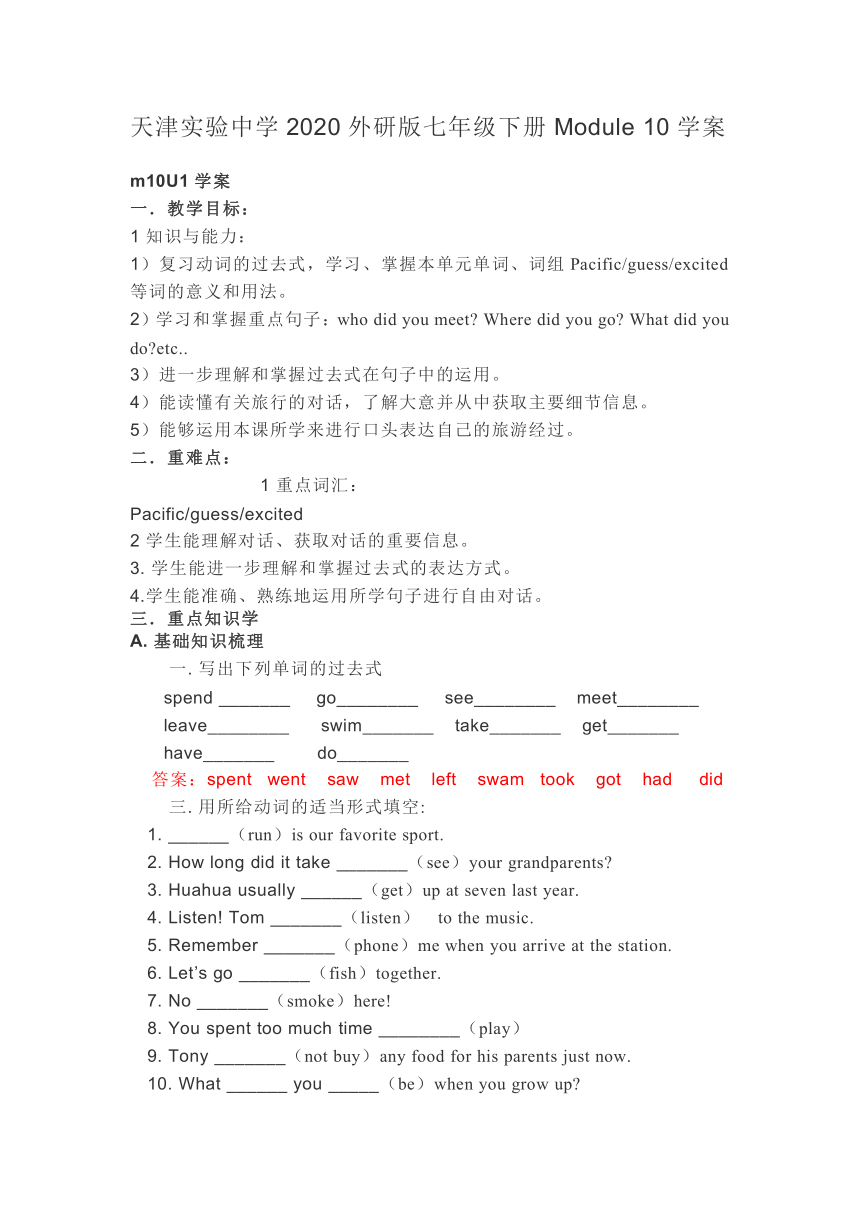
天津实验中学2020外研版七年级下册Module 10学案 m10U1学案 一.教学目标: 1?知识与能力: 1)复习动词的过去式,学习、掌握本单元单词、词组Pacific/guess/excited等词的意义和用法。 2)学习和掌握重点句子:who did you meet? Where did you go? What did you do?etc.. 3)进一步理解和掌握过去式在句子中的运用。 4)能读懂有关旅行的对话,了解大意并从中获取主要细节信息。 5)能够运用本课所学来进行口头表达自己的旅游经过。 二.重难点: 1?重点词汇: Pacific/guess/excited 2?学生能理解对话、获取对话的重要信息。 3.?学生能进一步理解和掌握过去式的表达方式。 4.学生能准确、熟练地运用所学句子进行自由对话。 三.重点知识学 A.?基础知识梳理 一.?写出下列单词的过去式 spend _____ ???go_____ ???see_____ ??meet_____ leave_____ ????swim_____ ??take_____ ??get_____ have_____ ??????do_____ ??? ????答案:spent ?went ??saw ??met ??left ??swam ?took ??got ??had ???did 三.?用所给动词的适当形式填空: ? 1. _____(run)is our favorite sport. 2. How long did it take _____(see)your grandparents? 3. Huahua usually _____(get)up at seven last year. 4. Listen! Tom _____(listen)?to the music. 5. Remember _____(phone)me when you arrive at the station. 6. Let’s go _____(fish)together. 7. No _____(smoke)here! 8. You spent too much time _____(play) 9. Tony _____(not buy)any food for his parents just now. 10. What _____ you _____(be)when you grow up? ????答案:1. Running ??2. to see ????3. got ?????4. is listening ???5. to phone??6. to fish ???7. smoking ???8. playing ???9. didn’t buy ???10. will be ? B.?语法回顾 1. Where are you going on holiday, Tony??你假期打算去哪儿,?托尼? (be) on holiday?或?have a holiday?意为?“在度假”。Eg.?我们将度过暑假 ????We’ll be on summer holiday.=We’ll have a summer holiday. 2.I went there two years ago. 当句子中有ago时,一般用一般过去时。ago常用于某个时间段之后,且时间前面不用介词,意思是“……以前”。如: three days ago?三天以前 ?a moment ago ?片刻之前 3.How long did it take to get there?去那儿用了多长时间? take"花费",常用的句型: ????It takes sb some time to do sth ??花费某人多长时间做某事。It?为形式主语,后面的动词不定式为真正的主语。 4. spend?花费(时间和金钱),?人做主语。 常用结构: Sb+spend +?时间和金钱?+ on +sth. Sb+spend+时间和金钱+(in) +doing sth. e.g. I spend two yuan on the pen. He spent two days doing his work. 5. ?Then our friends met us and drove us to their home. ????然后我们的朋友与我们碰面,并开车将我们送回他们家。 (1)meet"迎接",它常见的含义: a.meet"遇见,碰见" Eg.Who did you meet at school yesterday ? b.meet"经介绍认识" Eg.I'm very happy to meet you. drive"开车"(v.&n.), drive sb. to sp.开车送某人去某地 go for a drive ?开车 6.I was so excited! 1. so?用法: 1)?副词,?意为“那么(尤指用于引出新话题);这么,那么(用于强调质量、感觉或数量)”。 2)?连词,意为“所以,因此”如: ?????I like trip, so I like holidays.?我喜欢旅游,所以我就喜欢假期。 3)?介词,意为“如此,这样”。如:I think so. ??我认为如此。 2. excited"激动的,兴奋的"(adj.)常用句型: be excited about/at sb./sth.对...感兴趣 Eg. My grandma is excited about watching Beijing opera. excit ... ...
~~ 您好,已阅读到文档的结尾了 ~~